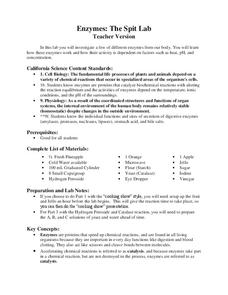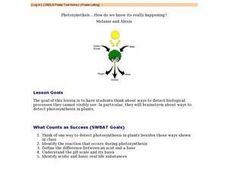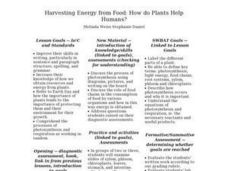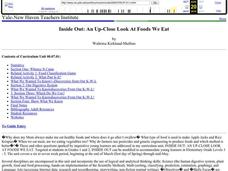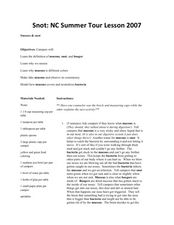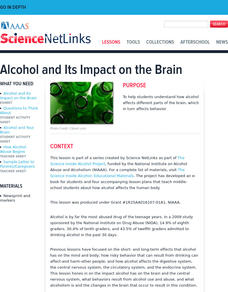Curated OER
What is Coral?
Students discuss what they know about coral reefs and are introduced to the importance of preserving coral reefs. In this coral reef instructional activity, students make connections between coral ecology in the classroom and in the real...
Curated OER
Good Food, Good Health
Learners investigate how food provides energy for the human body. In this physical health instructional activity, students access online resources to identify how certain foods can affect their health. Learners discuss how many servings...
Curated OER
Worm Watching
Learners examine the role earthworms play in building soils. They discuss worms and what they do with soil, make predictions and draw pictures, and observe their worms in soil over a two week period.
Curated OER
Testing for Life’s Molecules
Want to hear a joke about sodium? Na. Young scientists test various materials to identify if they include protein, starch, and glucose by using the Biuret test, iodine starch test, and Benedict's test respectively. After practicing with...
Consortium for Ocean Science Exploration and Engagement (COSEE)
Carbon Dioxide & Krill: Impacts
What effects do temperature and carbon dioxide levels have on the zooplankton of Antarctica? This concluding lesson plan in a short unit on climate change and the ocean helps environmental scientists answer these questions. After...
LABScI
Enzymes: The Spit Lab
Enzymes in our bodies each have a job to do. Learn the factors that affect the activity of some enzymes using the third activity of an informative 12-part biology series. A three-part laboratory activity asks teams to investigate how...
Curated OER
Photosynethsis....How do we know it's really happening? - Biology Teaching Thesis
Students think of one way to detect photosynthesis in plants besides those ways shown in class. They identify the reaction that occurs during photosynthesis. Students define the difference between an acid and a base. They identify acidic...
Curated OER
Harvesting Energy from Food: How do Plants Help Humans?
Beginning botanists view slides of plant vascular tissue. They watch Magic School Bus Gets Planted, which you can find online, and then write a summary of what they have learned about plants. This lesson could be used with upper...
Curated OER
Fun Faces of Wisconsin Agriculture: Curley's Beef Fast Facts
Learners explore animal slaughter by researching the Wisconsin beef industry. In this meat statistics lesson, students practice using different math functions to identify how many burgers or sports equipment can be made from one...
Chymist
Landfills and Recycling
Examine the nature of landfills through experimentation. Scholars build miniature landfills and monitor changes over a six-week period. Observations allow individuals to draw conclusions about the different types of trash and their...
Curated OER
Geometry: Practical Applications of the Distance Formula
Students, working independently and in groups, apply the distance formula to practical situations. After solving various problems, students in pairs design coordinate planes from the school blue print to measure the distance from the...
Curated OER
Teeth And Eating
Students explore and study all about teeth and eating. They examine types of teeth, how their teeth develop, looking after teeth and teeth in other animals. Each student also reviews the process of how teeth help all mankind to eat food.
Curated OER
The Three Worm Phyla
Ninth graders examine the three worm phyla. In this classification instructional activity, 9th graders observe, compare and contrast the planarian, tapeworm, and fluke.
Curated OER
Nutrition 3: Got Broccoli?
Students discover why the human body needs food in order to survive. In groups, they analyze advertising for the foods they eat the most and try to identify the nutritional value of them as well. They complete a worksheet showing them...
Curated OER
Inside Out: An Up-Close Look At Foods We Eat
Fourth graders identify the origins of meats and vegetables consumed by humans on a daily basis. They classify foods (meats, dairy products, grains...) and create a food pyramid.
Curated OER
Enzyme Lab
Students examine the effects of specific enzymes on samples of liver tissue, muscle tissue (chicken), apples, and potatoes.
Curated OER
Snot: NC Summer Tour Lesson 2007
Students study various aspects of mucous. In this mucous lesson, students investigate the purpose of mucous. Students create fake mucous.
Curated OER
Owl Pellet
Students discover an owl's diet. In this animal science lesson, students observe owl pellets, determining what the owl ate. Students put together the owl's food chain, after determining the animals in the owl's diet.
Curated OER
Blend-A-Plant Levels of Organization
Young scholars' identify and analyze the levels of organization and the emergent properties through experimentation. Students' apply the differences in the properties of a plant before and after it has been subjected to a kitchen blender.
Curated OER
Alcohol and Its Impact on the Brain
Students examine water as it changes states. In water and ice activity students study the water cycle and what happens to it as it changes state.
Curated OER
Mussel Anatomy Lesson Plan
Students identify the parts and functions of a mussel. They explain how its physical adaptations help it survive in its habitat. They label the parts as a quiz to complete the activity.
Curated OER
9 Phyla of the Animalia Kingdom.
Students identify characteristics of all 9 phyla of the Animalia Kingdom. They create a table of the 9 phyla and research a representative organism for each.
Curated OER
Embryological Development Using Medaka Fish
Students analyze and record major events that occur in the development of Medaka fish eggs from fertilization to hatching. In small group, students describe the processes involved, creating a timeline of the major events in the...
Curated OER
Cooking Lesson
Fourth graders taste different flavors on their popcorn. In this taste bud lesson, 4th graders make predictions about taste and dip popcorn into four different flavors. They record how the flavors tasted - sweet, salty, bitter, or sour.







